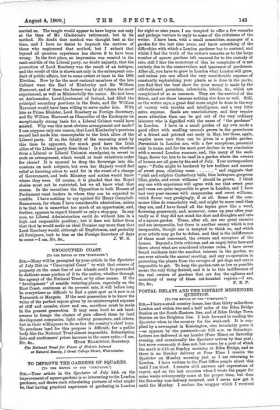TO IMPROVE THE GARDENS OF SQUARES.
[TO THE EDITOR OF TIIR “SpEcre.rort."]
Srs,—Your article in the Spectator of July 14th on the improvement of square gardens is so interesting to the London gardener, and draws such stimulating pictures of what might be, that having practical experience of gardening in London for eight or nine years, I am tempted to offer a few remarks and perhaps venture to reply to some of the criticisms of the writer. I have been, with a small committee, manager of a garden for the last nine years, and know something of the difficulties with which a London gardener has to contend, and whilst I feel the truth of the writer's remarks as to the large number of square gardens left uncared for to the custody of cats, still I fear the monotony of idea he complains of is not entirely due to the conservatism and ignorance of gardeners. After all, you have to grow in London what London will grow, and unless you can afford the very considerable expense of constantly replenishing your plants as is done in the parks, you find that the best show for your money is made by the old-fashioned geranium, calceolaxia, lobelia, &c., which are complained of as so common. They are the survival of the fittest, and are there because nothing else does so well. Still, as the writer says, a great deal more might be done in the way of variety with trouble and intelligence, and a very little extra expense. Seeds are unsatisfactory, and they require more attention than can be got out of the very ordinary labourer who is dignified with the name of "the gardener" in London. I have in a small garden of my own made a good effect with seedling annuals grown in the greenhouse of a friend and pricked out early in May, but these, again, require more care than can be given in a public garden. Perennials in London are, with a few exceptions, perennial only in name, and for the most part decline to try conclusion with a second London summer, and, like many of the seed- lings, flower too late to be used in a garden where the owners of houses are all gone by the end of July. Your correspondent says : "Paths might be bordered by low trellises and masses of sweet peas, climbing roses " and suggests that "pink and sulphur Canterbury bells, blue larkspurs, gorgeous lilies, pinks, and sweet vrilliams " should be grown. I think any one with experience will agree with me that sweet peas and roses are quite impossible to grow in London, and I have had very poor success with campanulas and sweet williams, which flower very grudgingly, if at all. Some of the com- moner lilies do remarkably well, and might be more used than they are, and I have found all the lupins grow like a weed, flowering generously, and, moreover, come up year after year really as if they did not mind the dust and draughts and cats of a square garden. These, after all, are our great enemies and are insuperable, but there is another enemy which is not insuperable, though one is tempted to think so, and which your article may go far to defeat, and that is the indifference of those most concerned, the owners and occupiers of the houses. Beyond a little criticism and an angry letter here and there about what are considered irksome rules, I have never found residents take the smallest interest in the garden, no one ever attends the annual meeting, and any co-operation in protecting the plants from the ravages of pet dogs and cats is impossible to get. To keep the garden-rate as low as possible seems the only thing desired, and it is to this indifference of the real owners of gardens that are due the ugliness and monotony of many of these cat-haunted regions.—I am,


































 Previous page
Previous page